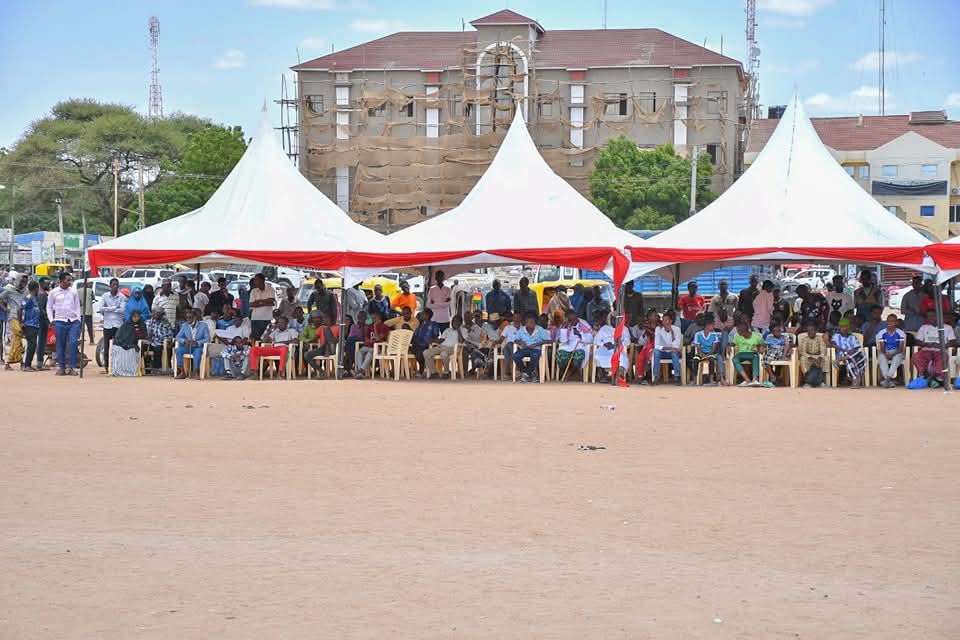Medics tackling mental health illnesses in Northern Kenya through awareness

According to Dr. Mohamed Adan Hillow, the only psychiatrist in Northern Kenya stationed at Garissa County Referral Hospital, understanding the signs and symptoms of mental illness is the first step toward offering meaningful help.
Mental illness remains a pressing but often overlooked public health issue in Garissa and many parts of northern Kenya.
While awareness about physical health has increased over the years, mental health continues to be surrounded by stigma, misinformation, and silence.
As a result, those suffering from conditions such as depression, anxiety, bipolar disorder, and schizophrenia often endure their struggles alone, without proper support or treatment.
According to Dr. Mohamed Adan Hillow, the only psychiatrist in Northern Kenya stationed at Garissa County Referral Hospital, understanding the signs and symptoms of mental illness is the first step toward offering meaningful help.
“Mental health issues can affect anyone. Young, old, rich or poor. Unfortunately, most people wait until the condition worsens before seeking help,” he said.
Dr. Hillow noted that although each condition presents differently, there are some common warning signs that should raise concern.
These include social withdrawal, persistent sadness, dramatic mood swings, confused thinking, excessive worry, hallucinations, changes in sleep and appetite, loss of interest in daily life, and suicidal thoughts.
Recognizing these symptoms early and encouraging timely medical intervention can prevent serious deterioration and even save lives.
However, the way in which the community responds to someone showing these signs is crucial.
“First and foremost, don’t judge or dismiss them. Offer a listening ear and encourage them to speak to a trained mental health professional,” Dr. Hillow advised.
He stressed the importance of using respectful language and avoiding harmful terms like “crazy” or “possessed,” which reinforce stigma and drive people further into isolation.
Support from family and the wider community plays a key role in the recovery journey. Dr. Hillow pointed out that simple acts of kindness like checking in on someone, helping them with daily tasks and accompanying them to hospital visits can significantly improve outcomes.
"Mental health support does not always require specialized training. Often, it starts with compassion and understanding," he added.
In Garissa County and surrounding regions, access to professional mental health care remains limited. There is a shortage of trained psychiatrists, and many rural communities lack even basic counseling services.
Dr. Hillow observed that because of cultural beliefs and misinformation, many patients seek help from traditional and religious healers first, delaying proper diagnosis and treatment.
“There is still a widespread belief that mental illness is caused by curses and spirits,” he said. “This prevents people from coming to the hospital until it’s too late.”
To combat this, Dr. Hillow is calling for a stronger partnership between healthcare providers, religious leaders, local chiefs, and community-based organizations to educate the public about the realities of mental illness.
“We need to break the silence,” he said.
“Mental illness is a medical condition like any other, and with the right treatment and support, people can recover and lead fulfilling lives.”
He further emphasized the need for the government and development partners to invest more in mental health services.
The psychiatrist suggests hiring more professionals, equipping health facilities, integrating mental health into primary care, and running public education campaigns that normalize seeking help.
“We must treat mental illness like any other health condition. With the right treatment and support, people can live full and productive lives,” Dr. Hillow emphasized.
According to the National Library of Medicine (NLM), an estimated 75% of Kenyans do not have access to mental health services, with almost half of the country’s counties still lacking psychiatric care units.
“Government investment in mental health is critically low—accounting for just 0.01% of total health spending, and there is no specific budget allocated for mental health,” the NLM noted.
The organization also estimates that mental health disorders affect approximately 4.4% of Kenya’s population, with depression, anxiety, post-traumatic stress disorder (PTSD), and substance abuse being the most prevalent conditions.
The burden of mental illness continues to grow, especially among youth dealing with unemployment, drug abuse, and trauma in many parts of Northern Kenya.
Families, schools, religious institutions, and the media have been urged to all play their part in changing perceptions and making mental health a community priority.
“This will help those affected find the courage to seek help, speak up, and begin the journey toward healing,” said the Garissa County Referral Hospital psychiatrist.
